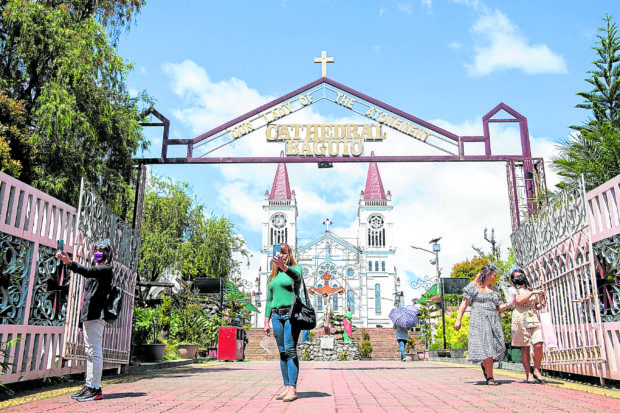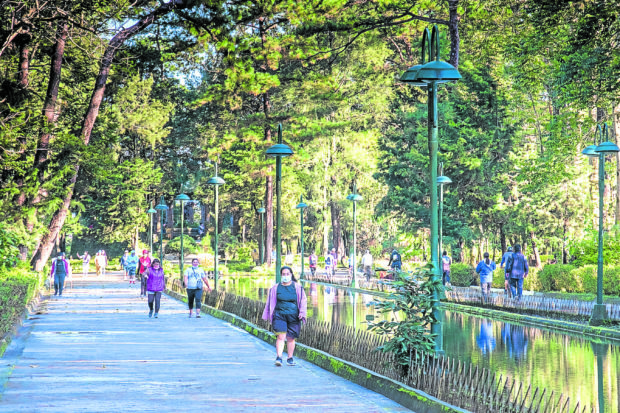
SUMMER CAPITAL LANDMARK The 85-year-old Our Lady of the Atonement Cathedral, popularly known as the Baguio cathedral, has become a refuge for the faithful amid the pandemic. As Baguio City resumes nonleisure travel this week, the church is expected to welcome visitors wanting to pray and hear Mass. —NEIL CLARK ONGCHANGCO/CONTRIBUTOR
BAGUIO CITY, Benguet, Philippines — A week before the country observes All Saints’ Day and All Souls’ Day, the summer capital has reopened its borders to leisure travelers who are fully vaccinated against COVID-19.
The city government is updating the guidelines for more relaxed travel as an influx of guests is expected in time for “Undas,” Mayor Benjamin Magalong said on Monday.
“We are again reopening the economy. It’s been two months since we applied restrictions on nonessential travel,” the mayor told reporters here after the weekly flag raising ceremony.
He said children who were permitted by their parents to undergo rapid antigen tests would also be allowed entry into the city as part of the eased travel restrictions.
But Magalong said tourists would still be required to secure negative COVID-19 test results before going through medical triage.
They must also follow routine entry protocols, such as submitting first to an online screening process via a travel registration platform called Visita (Visitor Information and Travel Assistance application).
According to Magalong, minors age 12 to 17 years old will need to get tested for COVID-19, although this age group would already be eligible for vaccination outside Metro Manila, which is piloting inoculations for the youth, this month.

WALK IN THE PARK Baguio residents enjoy their morning exercises at Wright Park as the city government allows outdoor activities for locals and visitors subject to observance of health protocols. —NEIL CLARK ONGCHANGCO
Baguio first accepted tourists at a limited capacity in October last year at the height of strict quarantine by allowing in tourists from the Ilocos region under a travel bubble. It eventually extended the bubble to visitors from Metro Manila and Central Luzon.
Dropping cases
Baguio closed its doors again to visitors at the start of September because of the unusually high COVID-19 transmissions by the end of August and the subsequent month that raised active cases to over 4,000 for days.
Infections began to subside this month as the daily average number of COVID-19 cases dropped to 70 from 280 in September.
On Sunday, only 58 new cases were recorded in Baguio, which brought its active COVID-19 cases to 890.
The high number of COVID-19 cases in September was attributed to the highly infectious Delta variant that caused the city’s total number of cases to shoot up to 28,859. The disease has already killed 626 residents.

